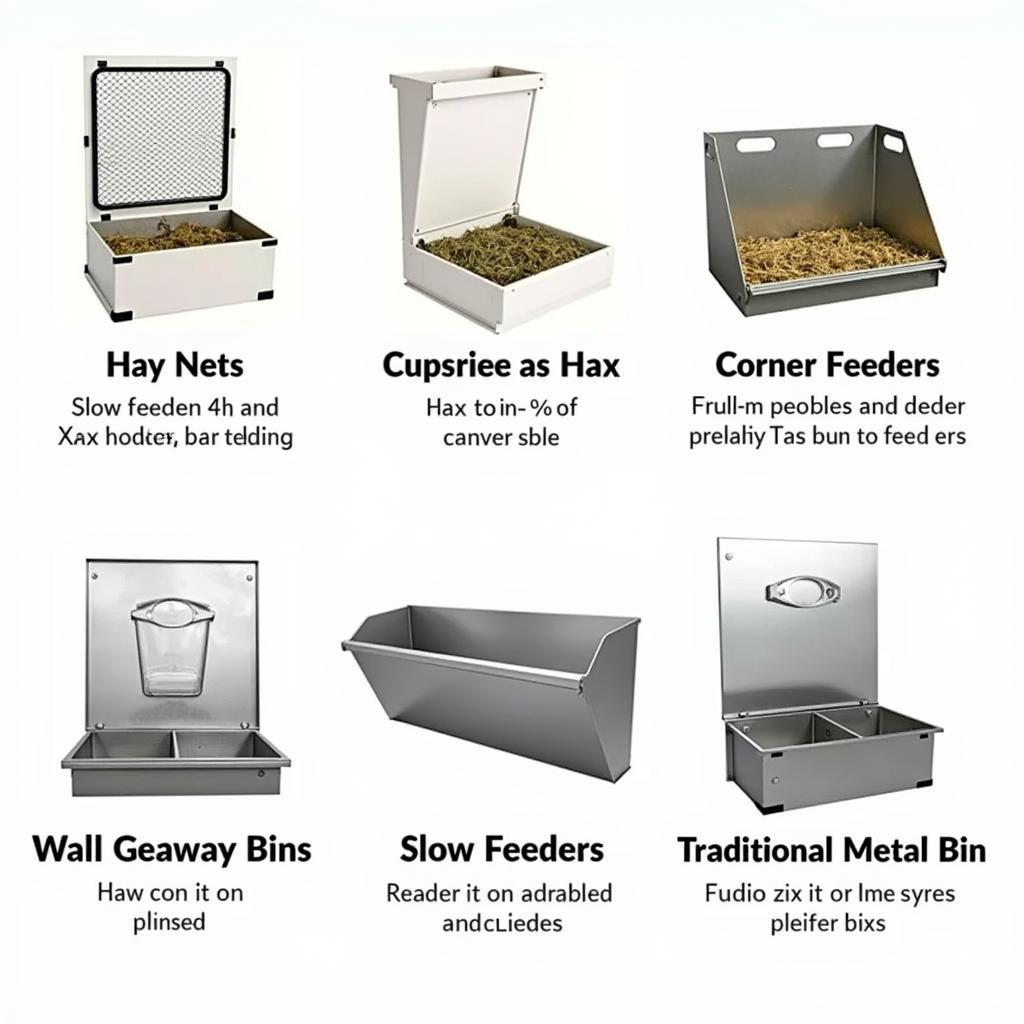A Wall Feeder Horse is a practical and efficient way to provide hay or grain to your equine companion. Choosing the right one can significantly impact your horse’s health, minimize feed waste, and make stable management a breeze. This article will delve into the world of wall feeder horses, exploring various types, materials, and benefits to help you make the best choice for your stable.  Different Types of Wall Feeders for Horses
Different Types of Wall Feeders for Horses
Understanding the Benefits of a Wall Feeder Horse
Wall feeders offer a plethora of advantages for both horses and their owners. Elevated feeding positions can help prevent respiratory issues by reducing dust inhalation. They also promote natural grazing posture, which is better for your horse’s digestive system. Furthermore, wall feeders keep feed off the floor, minimizing contamination and waste. hay feeder horses can be particularly beneficial for maintaining hay quality and reducing waste.
Types of Wall Feeder Horses: Finding the Perfect Fit
Several types of wall feeders cater to different needs and preferences. Hay nets are a popular choice, providing slow feeding and reducing boredom. Corner feeders maximize space in smaller stalls, while traditional metal bins offer a simple and durable option. Slow feeders are excellent for managing horses prone to overeating.
Material Matters: Durability and Safety
The material of your wall feeder is crucial for its longevity and your horse’s safety. Durable, rust-resistant materials like galvanized steel or heavy-duty plastic are ideal. Avoid materials that could splinter or break, posing a choking hazard. For miniature horses, consider smaller, specialized miniature horse hay feeders designed for their size.
Choosing the Right Size and Capacity
The size and capacity of your wall feeder should align with your horse’s size, breed, and feeding needs. A larger horse will require a larger feeder to accommodate its head and prevent crowding. Consider how much hay or grain you typically feed per meal to determine the necessary capacity.
Installation and Maintenance: Keeping it Secure and Clean
Proper installation is critical for safety and stability. Ensure the feeder is securely mounted to the wall at a comfortable height for your horse. Regular cleaning is essential to prevent mold and bacterial growth.
What are the benefits of using a wall feeder for my horse?
Wall feeders reduce waste, promote healthy eating posture, and minimize dust inhalation. They are also easier to clean and maintain compared to ground feeders.
How do I choose the right size wall feeder?
Consider your horse’s size and breed, as well as how much feed you typically provide. feeders for horse stalls are available in various sizes to suit different needs.
“A well-chosen wall feeder can significantly improve your horse’s overall well-being,” says equine nutritionist, Dr. Sarah Miller. “It’s a small investment that yields substantial benefits in terms of health, safety, and convenience.”
How often should I clean my horse’s wall feeder?
Regular cleaning, at least weekly, is recommended to prevent mold and bacterial buildup.
“Maintaining a clean feeding environment is crucial for preventing digestive issues and promoting optimal health,” adds Dr. Miller. “A clean feeder contributes significantly to a healthy horse.”
Making the Most of Your Wall Feeder Horse
Choosing the right wall feeder is a significant step towards improving your horse’s feeding experience and simplifying your stable management routine. manger horse can also be a beneficial addition to your stable. By carefully considering the factors discussed above, you can select a wall feeder that caters to your horse’s individual needs and ensures they receive their feed in a safe, healthy, and efficient manner. A wall feeder horse offers a practical solution to many common feeding challenges.
FAQ
- Can I use a wall feeder for all types of feed?
- How high should I mount a wall feeder?
- What are the best materials for a wall feeder?
- How often should I clean a wall feeder?
- Are wall feeders suitable for all breeds of horses?
- How do I prevent my horse from wasting hay from a wall feeder?
- What is the average cost of a wall feeder horse?
Do horses get bored? Find out more by reading do horses get bored.
For further information or assistance in choosing the perfect wall feeder horse for your stable, please contact us. Phone: 0772127271, Email: [email protected] Or visit our location: QGM2+WX2, Vị Trung, Vị Thuỷ, Hậu Giang, Việt Nam. Our customer service team is available 24/7.